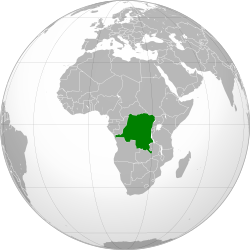Zaïre
| Republic of Zairea | ||||||||||
|
République du Zaïre Repubuliki ya Zaïre Jamhuri ya Zaïre |
||||||||||
|
||||||||||
|
||||||||||
|
Motto Paix – Justice – Travail "Peace – Justice – Work" |
||||||||||
|
Anthem La Zaïroise "The Song of Zaire" |
||||||||||
| Capital | Kinshasa | |||||||||
| Languages |
French Lingala · Kongo Swahili · Tshiluba |
|||||||||
| Religion | Christianity, Baluba religion, Bantu religion | |||||||||
| Government | Mobutist one-party statec under de facto military dictatorshipd |
|||||||||
| President | ||||||||||
| • | 1971–1997 | Mobutu Sese Seko | ||||||||
| Historical era | Cold War | |||||||||
| • | Coup d'etat | 25 November 1965 | ||||||||
| • | Country renamed | 27 October 1971 | ||||||||
| • | Mobutu overthrown | 16 May 1997 | ||||||||
| Area | ||||||||||
| • | 1996 | 2,345,410 km² (905,568 sq mi) | ||||||||
| Population | ||||||||||
| • | 1996 est. | 46,498,539 | ||||||||
| Density | 19.8 /km² (51.3 /sq mi) | |||||||||
| Currency | Zaïre | |||||||||
| Internet TLD | .zr | |||||||||
| Calling code | +243 | |||||||||
|
||||||||||
| a. Renamed from "Democratic Republic of the Congo" (République démocratique du Congo) on 27 October 1971. b. Changed from "Léopoldville" in 1966. c. Zaire became a de jure one-party state on December 23, 1970, but had been a de facto one-party state since May 20, 1967, the date on which the MPR (Mouvement Populaire de la Revolution) was established. Zaire formally adopted a multiparty system on April 24, 1990, when Mobutu delivered a speech proclaiming the end of the one-party system. The country adopted multipartyism de jure with the passage of Law No. 90-002 of July 5, 1990, which amended its constitution accordingly. d. 1990–1997. |
||||||||||
Zaire (/zɑːˈɪər/), officially the Republic of Zaire (French: République du Zaïre; French pronunciation: [za.iʁ]) was the name, between 1971 and 1997, of a state in Central Africa which was later renamed the Democratic Republic of the Congo, after the end of the Mobutu Sese Seko era. The state's name derived from the name of the Congo River, sometimes called Zaire in Portuguese, adapted from the Kongo word nzere or nzadi ("river that swallows all rivers").
Zaire was a one-party state and dictatorship, run by Mobutu Sese Seko and his ruling Popular Movement of the Revolution party. It was established following Mobutu's seizure of power in a military coup in 1965, following five years of political upheaval following independence known as the Congo Crisis. Zaire had a strongly centralist constitution and foreign assets were nationalized. A wider campaign of Authenticité, ridding the country of the influences from the colonial era of the Belgian Congo, was also launched under Mobutu's direction. Weakened by the end of American support after the end of the Cold War, Mobutu was forced to declare a new republic in 1990 to cope with demands for change. By the time of its disestablishment, Mobutu's rule was characterized by widespread cronyism, corruption and economic mismanagement.
...
Wikipedia



